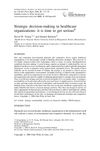 August 1996 in “Journal of Pediatric and Adolescent Gynecology”
August 1996 in “Journal of Pediatric and Adolescent Gynecology” The document concludes that PCOS in adolescents is complex and requires comprehensive care to manage its symptoms and associated health risks.
 991 citations,
January 2011 in “Nature Reviews Endocrinology”
991 citations,
January 2011 in “Nature Reviews Endocrinology” The document concludes that PCOS is a complex disorder caused by both genetic and environmental factors, affecting women's health in various ways, and requires personalized treatment.
 97 citations,
April 2016 in “Andrology”
97 citations,
April 2016 in “Andrology” Hormones and metabolism play a complex role in prostate enlargement, and more research is needed to improve diagnosis and treatment.
 22 citations,
January 2017 in “Skin appendage disorders”
22 citations,
January 2017 in “Skin appendage disorders” The conclusion is that primary scarring alopecia is a complex condition that requires early and accurate diagnosis for effective treatment.
 17 citations,
July 2006 in “The International Journal of Health Planning and Management”
17 citations,
July 2006 in “The International Journal of Health Planning and Management” Healthcare organizations must seriously focus on strategic decision-making to succeed in a complex market.
 4 citations,
April 2020 in “Facial Plastic Surgery Clinics of North America”
4 citations,
April 2020 in “Facial Plastic Surgery Clinics of North America” Hair loss in women is complex to diagnose and treat, and hair restoration should be done by experts. Using minoxidil before surgery can help manage post-surgery hair shock loss. The Follicular Unit Transplantation method is recommended for women due to its speed, no need for shaving, and better graft quality. Strategies like L, T, and reverse L patterns can help restore central hair density, and regenerative methods can improve graft survival in hair transplants.
 3 citations,
December 2022 in “bioRxiv (Cold Spring Harbor Laboratory)”
3 citations,
December 2022 in “bioRxiv (Cold Spring Harbor Laboratory)” The research reveals how early embryonic mouse skin develops from simple to complex structures, identifying various cell types and their roles in this process.
 2 citations,
June 2016 in “Dermatologic Clinics”
2 citations,
June 2016 in “Dermatologic Clinics” Dermatologists often neglect hair disorders due to complexity and lack of clear treatments, impacting patient care and highlighting the need for better education and interest in this area.
 2 citations,
May 2001 in “Current problems in dermatology”
2 citations,
May 2001 in “Current problems in dermatology” The conclusion is that effectively treating hair disorders is difficult due to the complex factors affecting hair growth and more research is needed to improve treatments.
 1 citations,
July 2014 in “Our Dermatology Online”
1 citations,
July 2014 in “Our Dermatology Online” The patient with both scarring and non-scarring hair loss showed complex immune reactions and improved with steroid treatment.

A thorough diagnostic process and teamwork are crucial for managing complex hyperandrogenism in postmenopausal women.

Autonomous robotic surgery is advancing but still requires human supervision for complex procedures.
 October 2020 in “Revista médica sinergía/Revista médica sinergia”
October 2020 in “Revista médica sinergía/Revista médica sinergia” Alopecia areata is a complex condition causing hair loss, linked to genetics and immune system issues, and may be related to other autoimmune diseases; treatments vary in effectiveness.

Eating less calories, focusing on complex carbs, and reducing fats can help manage type II diabetes.
 1514 citations,
December 2011 in “Fertility and sterility”
1514 citations,
December 2011 in “Fertility and sterility” Experts agree that PCOS affects women's health in complex ways, but more research is needed to understand and treat it effectively.
 305 citations,
July 2016 in “International Journal of Biological Macromolecules”
305 citations,
July 2016 in “International Journal of Biological Macromolecules” Polysaccharides have many health benefits and are used in drugs, but isolating and purifying them is complex and requires careful methods.
 117 citations,
August 2008 in “Sociology of Health and Illness”
117 citations,
August 2008 in “Sociology of Health and Illness” The conclusion is that the increasing use of drugs for lifestyle reasons is a complex issue influenced by corporate profit, consumer behavior, and the medicalization of everyday life, with potential negative effects on personal well-being.
 35 citations,
May 2015 in “Thrombosis Research”
35 citations,
May 2015 in “Thrombosis Research” Prostaglandin E2 affects human platelet activity in complex ways that could lead to personalized heart disease treatments.
 24 citations,
October 2014 in “Cold Spring Harbor Perspectives in Medicine”
24 citations,
October 2014 in “Cold Spring Harbor Perspectives in Medicine” Genetic research has advanced our understanding of skin diseases, but complex conditions require an integrative approach for deeper insight.
 8 citations,
April 2018 in “Facial Plastic Surgery”
8 citations,
April 2018 in “Facial Plastic Surgery” Men and women have different hairline restoration needs, with natural design being more complex for women, and hairline changes being important for transgender individuals' transitions.
 March 2017 in “Trichology and cosmetology:”
March 2017 in “Trichology and cosmetology:” Psoriasis treatment may affect body hair growth, with a complex relationship between skin and hair growth mechanisms.
 September 2016 in “Princeton University Press eBooks”
September 2016 in “Princeton University Press eBooks” The document concludes that understanding health requires considering evolutionary perspectives on reproductive fitness, and recognizing the complexity of factors like diet, testosterone, and sexual orientation.
 49 citations,
December 2009 in “Journal of Investigative Dermatology”
49 citations,
December 2009 in “Journal of Investigative Dermatology” Thyroid function affects skin health, with a complex interaction between the two.
 14 citations,
July 2017 in “Monatshefte für Chemie - Chemical Monthly”
14 citations,
July 2017 in “Monatshefte für Chemie - Chemical Monthly” Analytical chemistry helps understand the makeup and use of ancient medicines, but it's complex and challenging.
 82 citations,
June 2020 in “Inflammation Research”
82 citations,
June 2020 in “Inflammation Research” Skin problems in COVID-19 patients are rare and may be due to the body's complex immune response or blood clotting issues.
 74 citations,
September 1980 in “Medical Clinics of North America”
74 citations,
September 1980 in “Medical Clinics of North America” Toxic epidermal necrolysis is a severe skin condition often caused by drugs, with complex treatment and a high risk of death, but survivors usually heal without scars.
 2 citations,
May 2020 in “Anais brasileiros de dermatologia/Anais Brasileiros de Dermatologia”
2 citations,
May 2020 in “Anais brasileiros de dermatologia/Anais Brasileiros de Dermatologia” Primary health care in Florianópolis mostly treated simple skin conditions, while secondary care handled more complex skin diseases.
 August 2014 in “Journal of The American Academy of Dermatology”
August 2014 in “Journal of The American Academy of Dermatology” Obesity is linked to more severe hair loss in adult men and to excess hair growth, but its effects on hair conditions are complex and need more research.
 1039 citations,
February 2009 in “Nature Reviews Molecular Cell Biology”
1039 citations,
February 2009 in “Nature Reviews Molecular Cell Biology” Skin stem cells are crucial for maintaining and repairing the skin and hair, using a complex mix of signals to do so.
 43 citations,
October 2013 in “Journal of Investigative Dermatology”
43 citations,
October 2013 in “Journal of Investigative Dermatology” Organotypic culture systems can grow skin tissues that mimic real skin functions and are useful for skin disease and hair growth research, but they don't fully replicate skin complexity.






























